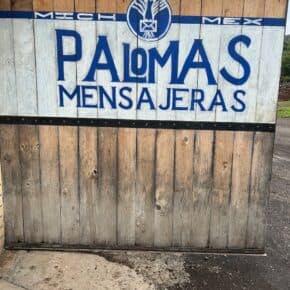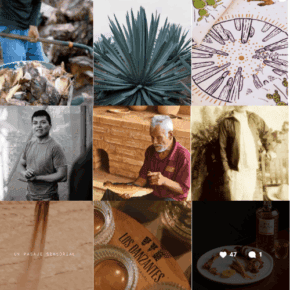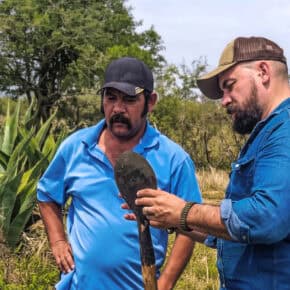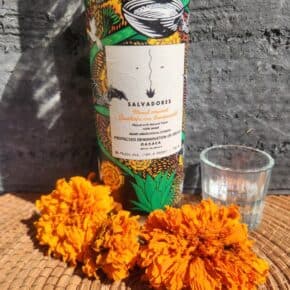Another year, another mezcal brand, another mezcal brand that declares that it will focus on the factors that make mezcal different by sustaining them. But this one is different because of the people behind it and what they’re actually doing. The brand is Comunidad. Its substance is a clear argument for the honesty of that statement. And its backers have a clear track record.
Comunidad is a new label of tiny, one time, mezcal batches curated by Ansley Coale and Hector Vasquez de Abarca who have a long track record of bottling amazing mezcals and working closely with their producers. De Abarca used to be in charge of production at Los Danzantes, a mezcal brand that Coale’s company, Craft Distillers, imports into the United States under the name Los Nahuales. Together they are “collaborating on a project to find, bottle, and represent superb agave spirits with the intent of helping to preserve the society and culture from which they come.”
In practice that means that they’re visiting tiny distillers across Oaxaca, purchasing batches of about 200 liters, bottling, and exporting them to the US. The batches are sold through Caddell & Williams and, at least for now, the only way to know which batches are available is by checking that web site or subscribing to the Caddell & Williams newsletter. The first two batches are a mezcla of Cuishes, Coyote, and Espadin by Alberto Ortiz aka “Don Beto” and a Coyote by Ángel Cruz Robles. All of the Comunidad batches will by numbered and labeled by their village: Don Beto’s is called Bramaderos after the small village where he distills outside of Miahuatlan while Robles’ is called El Lazo after the small village where he distills outside of Sola de Vega.
Coale and de Abarca’s vision is to bring mezcal back to where it started, small batch production that respects the creator and community where it was produced. Those intimate connections between finding the agave, making it into mezcal, and keeping that knowledge and the ensuing resources in the community so that it can continue to thrive are what make the culture of mezcal alive. That extends to the skill of distilling which Coale says simply “you either you have this capacity inside of you or you don’t.” He asked Don Beto how he knew what was going on inside his clay still as it was distilling. Beto went over and touched it. As Coale and de Abarca write: “Comunidad is about keeping this alive, about deflecting the pressure to commoditize the product (which would mean commoditizing the culture from which it comes). Modernization means doing to agave spirits what happened to whiskey, cognac, rum. Let’s not do that. Let’s keep a great thing going.”
The fact that Coale has been doing this sort of work for his entire career says plenty about Comunidad’s bona fides. While his distilling history started with brandy in Northern California it has expanded to importing mezcal brands like Alipus and curating batches for the Mezcalero project – which closely resembles Comunidad. As we’ve seen with the ongoing struggle over the mezcal appellation and profound questions about sustainability in the industry, it may be impossible to create a useful certification standard. It may be impossible for an appellation to represent producers, their culture, and the expectations of a foreign audience – so trust in the people behind the brand may be the only substitute.
Trust only goes so far, that’s where transparency can help. Comunidad’s bottles feature the maker’s name and their photos are the label art. Key information about where and how it was made is front and center. One key point: These bottles are all labeled as “Destilado de Agave Artesanal” even if the distilleries where they’re made are certified. That’s because it is both too expensive to certify small batches like this and the entire concept of Comunidad is to avoid the bureaucratic structures which have created such complex and issue laden burdens for the industry.
De Abarca and Coale are also working within the existing culture of mezcal production where maestros mezcaleros produce small batches seasonally as they have access to agaves. These distillers use agaves that are ripe, when they are ripe. They make mezcal as part of a larger cultural economy. It’s not an industry independent of the community producing for international markets but an extension of the local culture. These are the batches that they can sell on the market. Some is held back for local consumption but these makers frequently have other jobs in agriculture that keep them busy the rest of the year. And that work isn’t an arcadian idyl, it’s hard, physical, but it’s their culture.
The real question is whether mezcal can help maintain it. As Coale told me “What I’m really hoping for is to convince people that you can’t fake it. If we become a brand that is known for exquisite quality, and that the money is going back to the community,” then they’ll know they’ve made it.












Leave a Comment